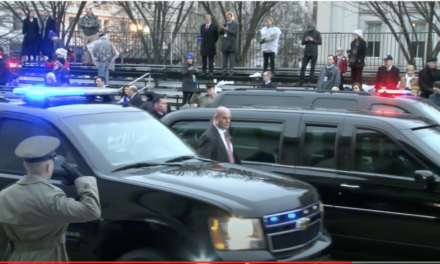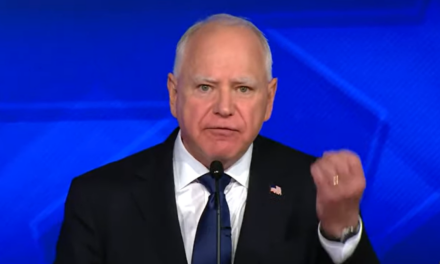We support our Publishers and Content Creators. You can view this story on their website by CLICKING HERE.
Growing up as a Christian in America, whenever politics came up in conversation, my response was typically, “I hate politics,” and then the conversation would move on to something more important, like football.
Like me, many American Christians tend to be politically disinterested. I was visiting a church recently where the pastor explained why he doesn’t generally preach about political issues. He said, “Our hope is not in any politician, our hope is in Jesus. Politics does not change hearts, revival does.”
It’s true that our hope is in Jesus, not Donald Trump, but does engaging in politics really close the door to revival?
Give to Caesar What Belongs to Caesar
When Jesus is asked whether or not to pay taxes to the government, he replies “Give to Caesar what belongs to Caesar, and to God what belongs to God” (Mark 12:17, NIV).
Much of the American church has interpreted this to mean that there should be some sort of separation between the church and the state. Seventy percent of people surveyed agree that “churches and other houses of worship should stay out of politics.”
The rise of the “seeker-friendly” church model has also led an increasing number of churches across America to avoid politically controversial teachings in order to appeal to as many people as possible.
When it comes to Mark 12:17, though, the context matters. When Jesus says “give to Caesar what belongs to Caesar,” he is referring to tax policy. Similarly, 15 years ago, the most pressing political issue of the time according to voters was the economy.
Today our political debates are no longer just about taxes; they’re about the definition of marriage, gender ideology, and the humanity of an unborn child. These are not questions of policy, they are questions of theology.
A study by the Barna Group revealed that while 90 percent of pastors believe that the Bible speaks to issues like sexuality, marriage, and abortion, 50 percent of them are hesitant to speak out on these issues for fear of creating division along political lines.
The scope of the political conversation is shifting to include theological questions, but now that these theological questions also have political implications, the church is going silent. The political umbrella is expanding into theological territory, and we are being manipulated into giving to Caesar what belongs to God.
A Church in Retreat
The American Church’s retreat from politically controversial issues is not just something that affects our outward influence on secular society, it is something that is destroying us from within.
According to the Pew Research Center, almost two-thirds of Christians surveyed say they trust their pastor’s views on political issues like abortion and immigration. As church leadership goes silent on these issues, secular voices are stepping in. Not only is American culture trending against traditional morality, the church is not far behind.
Over the last 20 years, support for same-sex marriage among evangelical protestants has grown from roughly 1 in 10, to 1 in 3. In 2008, Barack Obama himself said “marriage is between a man and a woman.” In 2015, he lit up the White House in rainbow colors to celebrate pride month. And now in 2024, it is no longer uncommon to see rainbow flags flown from church steeples.
As we lose sight of the values that once set us apart, the lines between the “world” and the “church” are beginning to blur. The church’s silence on politically controversial issues, although well-meaning, is causing theological confusion among its own members and is contributing to the decline of Christianity in America.
The False Choice of Revival or Politics
When the pastor declared, “Politics does not change hearts, revival does,” the congregation erupted in claps and “amens.” I found myself clapping too, because it feels noble to seek revival instead of engaging in political debate. But what exactly does it mean to “seek revival?”
The first revival in Christian Church history is documented in Acts 2:14-41. When the Holy Spirit falls upon the apostles for the first time, Peter steps outside to preach to a crowd that has gathered.
Peter did not share a “seeker-friendly” message, but rather, one of the most politically charged messages in Church history. The Gospel was so controversial at the time that it eventually earned him and most of the other apostles the death penalty. But because of Peter’s willingness to speak the truth despite the political implications, more than three thousand people were baptized that day and the Christian church was born.
The same paradigm has been repeated by revivalists throughout history. Billy Graham denounced the evils of communism. John Wesley played a prominent role in abolishing the Transatlantic Slave Trade. And Martin Luther King Jr. preached that all men are created equal.
Christianity did not spread around the world despite its controversial ideas, Christianity spread around the world because of them. Each of these men spoke truth into some of the most politically divisive and controversial issues in human history. The result was not division, it was revival.
Surrendering Sacred Ground
The realm of politics is expanding to include theological issues, and the church is being manipulated into surrendering sacred ground. We are losing our congregations, losing our culture, and losing any chance we have at seeing revival.
In the book of Matthew, Jesus says “Blessed are the peacemakers, for they will be called children of God” (Matthew 5:9). In times of moral and theological crisis, silence is not peacemaking — it’s surrender.
The good news for the Christian who hates politics is that it’s not actually about politics at all. It’s about truth. The church is called to stand for truth, not because it is or is not political, but because it is true.
And if we are hated for it we are in good company; Jesus said “If the world hates you, keep in mind that it hated me first. If you belonged to the world, it would love you as its own” (John 15:18).
Politics does not change hearts, revival does — but we are not going to experience revival until we are willing to speak the truth, even if it happens to be political.
John Laychak is an American business owner and copywriter with a masters degree from Southeastern University’s College of Ministry and Theology.

 Conservative
Conservative  Search
Search Trending
Trending Current News
Current News 





